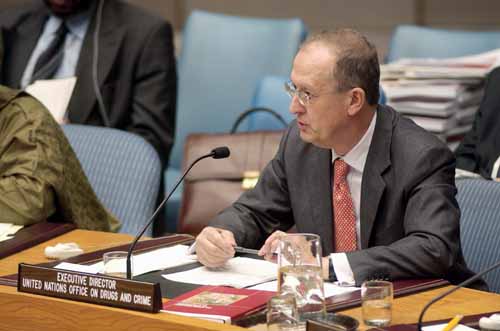Axel Klein, GDPO Senior Research Associate.
April 24, 2019.
At the 62nd meeting of the UN Commission on Narcotic Drugs (CND) in March this year the tensions between states with widely diverging drug policies finally came to the surface. On the floor of the plenary meeting the Russian delegation took Canada to task for ‘violating international law [by] legalising cannabis.’ (http://cndblog.org/2019/03/plenary-item-9-implementation-of-the-international-drug-control-treaties-cont-2/)
The Russia delegate also took issue with the Expert Commission on Drug Dependence of the World Health Organisation for recommending that cannabis be moved from schedule 4 of the 1961 Single Convention on Narcotic Drugs and placed in the less strict schedule 1. Interestingly, the objection had nothing to do with either the new assessment of the harms posed by cannabis or its medical potential. What had given cause to offence was that the ‘perception of the world of the community would be that legalisation is fine and dandy. Probably the experts don’t have to go through the turmoil of thinking through the repercussions of their decisions. They are technical experts. Nothing more’ (emphasis added).
Technical issues, say of patient benefit, the need to address discrimination and stigma, or pre-empt trafficking were not touched upon. The Russian Federation’s statement also glossed over the fact that the placement was not designed to be permanently fixed. The original founders of the system expected that substances would move across the schedules as more scientific evidence became available. Important to recall here is that at the time that cannabis was slotted into schedule 4, tetrahydrocannabinol, the most important psychoactive substance, had not even been discovered.
The point of Russia’s attack on countries like Canada, Uruguay and several US states– though only Canada was singled out – was the risks that legalisation was having consequences.
Consequentialism has not been a driving force in the history of international drug control, given the ontological foundation of the treaties on the ‘welfare of mankind’. The system architects recruited ‘mankind’ to labour in the construction and then retire. Hence the object of Russian concern were not people in their totality or diverse sub-populations – patients, drug consumers, communities – but the ‘international drug control system’ itself.
Taking this to its logical conclusion, we then understand that adhering to the provisions of the three drug control conventions and the various associated agreements and protocols is only indirectly to do with problems of addiction and substance misuse. Their overriding purpose lies in protecting the functionaries and officials who work in it.
Such proposals tend to resonate particularly with representatives of countries with natural resource-based economies and authoritarian regimes. If the recent focus on human rights has already opened a divide between countries, the question of accountability is likely to push them even further apart. Justifying costly layers of administration to tax-paying electorates (though not to universities), is difficult at the best of times, but particularly when they fail to have a positive purpose.
And yet this is what the international system has long been lacking, at least according to Antonio Maria Costa, the former head of UNODC. In a seminal address to the CND in 2008 he stated with counter-intuitive perspicacity, that the ‘system was no longer fit for purpose’ and unable to contain a number of displacements.(Costa, Antonia Maria, Making drug control ‘fit for purpose’ Building on the UNGASS decade, Report by the Executive Director of the UNODC, 2008) The first he mentioned was the ‘huge criminal black market that now thrives in order to get prohibited substances from producers to consumers.’ Along with these markets comes the full spectrum of crime from large, police and policy corrupting syndicates to addiction fueled shoplifting. Such crime is the trade-off for containing the public health that is threatened by open drug markets. It is on this Faustian pact that the system is build.
Picking up on the admonition by the Russian delegate to consider the repercussions of our actions we need to review the criminogenic effect of drug control. This has to be done repeatedly and publicly precisely because it runs counter to the popular assumptions. In popular folklore, police and paramilitaries are believed to be breaking down doors and shooting up laboratories in ‘response’ to drug criminals. In effect, the causal effect runs the other way. The harder police and magistrates squeeze drug supply, the more devious and brutal the industry becomes when meeting the demand.
The fact that drug control generates crime needs to be repeated to policy makers at every level and may even hold sway with an audience that is otherwise immune to arguments about human rights, patient needs or stigmatization.
At the CND in Vienna most national delegations are comprised of and led by senior law enforcement officers or officials of the Ministry of Interior. If the realisation that vigorous enforcement is resulting in ever more vigorous criminality has not so far had much effect comes down to one of two possible sets of explanation. First, it could be that they are (i) simply not listening, (ii) the causal chain has not been understood, or (iii) is simply not believed. But the second explanation is that the criminal justice sector agencies and public have different objectives. The former are interested in expanding and increasing means and powers to enforce the law. And if public safety is one of the outcomes, so much the better.
In accordance with key tenets of institutional economics we hold that drug control and law enforcement are driven by motives of any social organism – self perpetuation. Hence the need for continuous checks and assessments of policy purpose and outcomes. Since all institutions also include well intentioned and dedicated professionals the need for restating the arguments of criminogenic consequence has to be repeated over and over.
Naturally it is much more difficult to achieve results in thematic areas where key policy decisions have been abstracted by remote and unaccountable international bodies. As the Russian delegate reminds of the importance of repercussions, it is high time to take back control.



